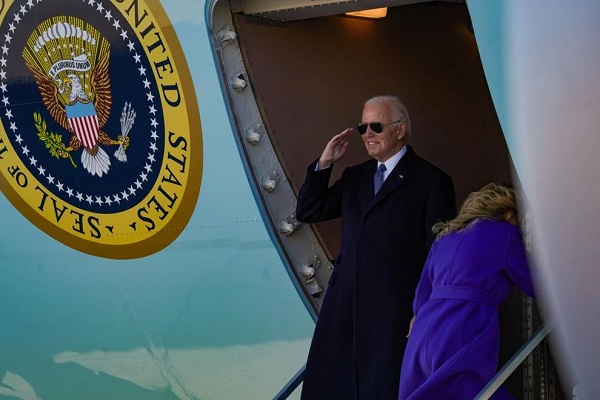Former President Joe Biden salutes the departure party before boarding Special Air Mission 46 at Joint Base Andrews, Md., Jan. 20, 2025.
From The Center Square
By Morgan Sweeney
No obvious solutions emerged during a congressional hearing Wednesday on how to hold those accountable for the alleged cover-up of President Joe Biden’s mental and cognitive decline, but witnesses had some suggestions for how to prevent similar situations in the future.
Republicans have been adamant for some time that Democratic lawmakers, the prior administration, the legacy media and those closest to Biden conspired to hide the former president’s mental and cognitive decline from the American people. More recently, allegations have surfaced that some of Biden’s staff or potentially others may have used an autopen – a machine that can replicate signatures – to sign official documents for Biden without his knowledge or consent.
From the Senate Judiciary Committee hearing on June 18th, 2025
Wednesday’s witnesses agreed that further investigation needs to be done into these questions. Republicans also explored what can be done after the fact and how to prevent similar events from happening in the future. The Senate Judiciary Committee’s hearing into those questions Wednesday’s boycotted by all but one Democrat.
Republicans didn’t miss the opportunity to call them out for it. U.S. Sen. Eric Schmitt, R-MO, said Democrats’ absence and their failure to call any witnesses to testify was “deeply disappointing” but “not surprising.”
“Their absence speaks volumes – an implicit admission that the truth is too inconvenient to face,” Schmitt said. “This de facto boycott is not just a refusal to participate. It’s a refusal to serve the American people who deserve answers about who was truly leading their government.”
From the Senate Judiciary Committee hearing on June 18th, 2025
Much of the hearing’s discussion revolved around proper uses of the autopen, which witnesses testified can only be rightfully used when the president specifically delegates its use to the user. The committee also discussed Section 4 of the 25th Amendment to the Constitution, which talks about succession in the case of a president becoming unfit or unable to fulfill the role. The amendment authorizes the vice president and a majority of the president’s cabinet to declare the president unfit, though that declaration has to be validated by a vote from Congress in order to have any effect.
What’s missing, however, is a clear manner of recourse for lawmakers or the public if those around the president fail to act despite plain signs he is incapable of holding office. Republicans wanted to know what they could do to prevent the alleged conspiracy from simply fading into history without consequences for any involved.
“As a government, it is imperative that we have clear contingency plans when emergency strikes, and yes, it is an emergency when we have a sitting president who is unable to discharge the duties of that office,” said U.S. Sen. John Cornyn, R-TX.
He asked witness Theo Wold, a visiting fellow for law and technology policy with The Heritage Foundation and who worked in the previous Trump administration, if any criminal statutes could be applied to those who are found to have participated in the alleged cover-up.
“In this case, some have suggested that there may be potential crimes committed by members of the Cabinet for failing to act basically, suborning perjury, forging, forging government documents, impersonating a federal officer, making false statements, conspiracy to defraud the United States, obstruction of justice, wire or mail fraud… Do you think there’s any application of any of those criminal statutes to the circumstances of the Biden presidency?” Cornyn asked.
“There very well could be,” Wold said, but he added that it would be “a question for a prosecutor to take up in their discretion.”
While witnesses agreed that anyone participating in a cover-up should be held accountable, the solutions for doing so weren’t as clear as recommendations for how to prevent similar situations in the future.
John Harrison, James Madison Distinguished Professor of Law at the University of Virginia, didn’t see an obvious method of redress for what already happened but suggested that Congress perhaps require greater documentation of presidential actions going forward.
Wold provided additional suggestions, such as a revival of discussion around “other guardrails” that can be imposed on the 25th Amendment. There was lively debate toward the end of Ronald Reagan’s presidency about adding a mental health professional to the White House medical team or “whether the surgeon general should oversee the inclusion of medical reporting as part of… the 25th Amendment,” according to Wold. But he said there hadn’t been serious discussion since on how to improve the amendment. He also agreed with Sen. Katie Britt, R-AL, that some of the terms in the amendment, like “unable,” should be more clearly defined.














